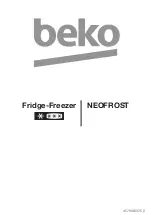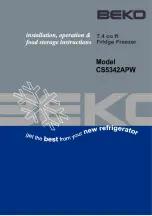
10
Warning
Your
ULT unit should be cared for by dedicated personnel. Every 2 to 4
hours, the unit's working status should be inspected and recorded on a daily basis.
Should there be a malfunction in the unit, the freezer temperature rises. If the
problems cannot be corrected in a short time, please remove the stored samples;
move them to another unit that meets the temperature requirement to avoid
potential damage of property.
Before loading the samples into the unit, make sure to check if the required
storage temperature matches the temperature capability of the freezer. This is to
avoid any property damage due to insufficient storage temperature for the
samples intended to be stored in the freezer.
Because it takes time for refrigeration temperature to reach the stored samples,
there is normally a temperature discrepancy between the actual shown
temperature and the set point. This is a normal phenomenon. The lower the set
point is, the smaller this temperature discrepancy becomes.
Haier
Caution
All ultra low temperature storage units are low temperature storage equipment. It
is prohibited to load an excessive amount of samples into the unit at one time.
The compressors run for a long period of time without stopping. The freezer
temperature may not decrease, and the compressors can become overheated.
Samples must be loaded in batches, and in stepwise decreasing temperature
setting. The process should be repeated until the final temperature is reached.
Do not use any unauthorized mechanical means to remove or defrost the unit.
Do not damage the refrigeration circuit.
Do not use any non manufacturer-approved electrical components in the freezer.
Operation after a power outage
Your
ULT freezer control setting is stored in its memory system. Should there be
a power outage and the power recovers, the unit can resume its operation based on the
prior set control settings.
Haier
Initial Loading
15
Warning:
To prevent electric shock or injury to operators, the AC power supply to the freezer
must be disconnected completely before any repair and maintenance work is to be performed.
During any repair maintenance work, do not breathe in medical particles or aerosols near the
equipment as they might be harmful to your health.
Cleaning the freezer
Clean the unit once a month. This can help the exterior look new.
Use a dry cloth to wipe off loose dust inside and outside of the freezer. If the unit is rather dirty,
use a clean cloth soaked with neutral detergent to clean the unit. Then use a dry cloth to wipe
off the left over detergent solution. Non-diluted detergent can harm plastic surfaces. Please
follow the instructions on how to mix a detergent solution.
Do not pour water directly onto the exterior and interior of the unit. Water can damage the
electrical insulation causing malfunction.
Compressors and other mechanical parts are hermetically sealed. They do not need
lubrication.
Clean the frost and ice off the unit once a month. Also, clean the condenser filter once a month.
Clean the condenser filter
When the control panel shows an alarm signal for Hot Condenser , the alarm light flashes. The
condenser filter must be cleaned to avoid compressor overheating and to improve refrigeration
efficiency. Even if the light is not on, the filter should still be
cleaned once a month. To clean the filter, follow the procedure
below.
1.Pull off the front grill cover.
2.Pull out the filter screen.
3.Use water to wash the filter screen.
4.Install the screen back in its original position and close the cover.
5.If the Hot Condenser light is on before cleaning, check the light to make sure the light is off after
cleaning.
Defrost the interior
Changing battery
Frost usually forms in the upper portion of the unit and the on the inner doors. Frost and ice can
form in between the door gasket and frame to form an air gap. It can decrease the refrigeration
effect of the unit. Follow the procedure below to defrost the interior doors using the plastic scraper.
The first step is to move the samples to another freezer before the procedure. Do not use any
sharp tools such as knife or screw driver to defrost.
1.Remove the samples from the unit that needs to be defrosted. Move them to another unit or a
container with a CO backup system for temporary storage.
2.Turn off any backup refrigeration system if there is one.
3.Turn off the power supply.
4.Open the outer door and inner doors to let the unit thaw for a period of time.
5.Use a dry cloth to soak up and remove the water on the floor of the unit.
6.After defrosting the unit and cleaning up the water, restart the unit.
7.Load the samples back into the unit after it reaches the set temperature.
8.Turn on the backup refrigeration system if necessary.
The battery that supports the power outage alarm is a consumable item. The life expectancy for
the battery is about 3 years. If the battery is more than 3 years old, the battery should be replaced
because the alarm function may not work properly , and the stored capacity could also be reduced.
To do so, please contact
2
Haier
Equipment and Instrument Service center.
Front protection
panel for refrigeration
compartment
Filter
screen.
Routine Maintenance
































